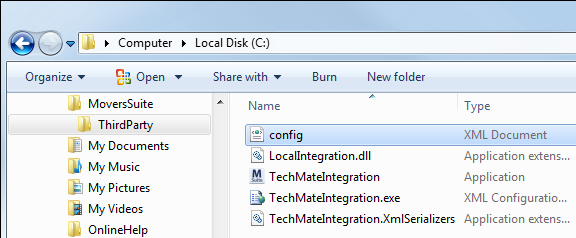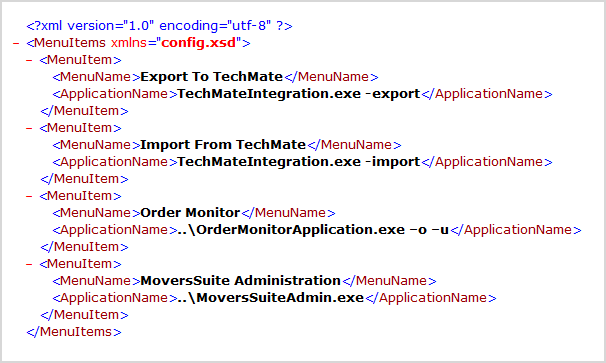
To access stand-alone applications from the Third Party Applications Menu, the Third Party Applications Menu configuration is set within an XML file rendered when the MoversSuite application starts up.

Figure 11: Third Party Application menu
Users can configure any executable program to run through this menu. To enable this functionality, a folder titled ThirdParty containing a configuration file titled config.xml must exist within the same application server hosting MoversSuite.

Figure 12: ThirdParty folder
The following is a sample config.xml file.

Figure 13: Sample config.xml file
The config.xml file contains a MenuItems property that is comprised of individual MenuItem properties (no letter “s”). Each MenuItem property represents a separate option in the Third Party Applications menu. Within each of the MenuItem properties are the two following elements:
|
MenuItem Elements |
Description |
|
MenuName |
This variable defines the text for the option within the Third Party Applications menu. |
|
ApplicationName |
MoversSuite executes the contents of this variable. This line will typically list the program name along with any run-time arguments needed by the program. The path of the program must be fully qualified, i.e. must point to the exact program file location. MoversSuite provides two additional parameters automatically passed to a program: A “-o” (dash followed by the letter “o”) passes the primary key for the order last accessed in MoversSuite and “-u” (dash followed by the letter “u”) passes the user ID for the person logged into MoversSuite. For example, when the application is executed, MoversSuite will automatically include the order primary key and user identification number similar to the following:
application.exe -o 1234 –u 39
Note: The order primary key is stored as the PriKey field within the Orders table and the user identification number corresponds to the UserAccessPriKey from the UserAccess table in the MoversSuite database. |
|
Note |
|
The config.xml file references config.xsd, which is a schema file that provides information on the type of elements needed by the config.xml file. Since the elements defined in config.xml are all default types for XML, the config.xsd is not required. |
RELATED TOPICS: